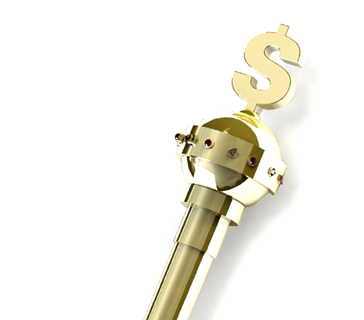Definition of Black Friday
What is 'Black Friday'?
Black Friday is a term given by the poker community to the events of April 15, 2011, when the United States Department of Justice issued an indictment against the three largest online poker websites in in the country: PokerStars, Full Tilt Poker, and Absolute Poker. Immediately following the indictment PokerStars and Full Tilt Poker, who generated the majority of online poker traffic, stopped offering players the chance to play for real money, effectively halting the poker boom started in the early 2000s and jeopardizing the livelihood of thousands of American poker players.
When Chris Moneymaker, an Internet qualifier, won the World Series of Poker in 2003, the event was attended by 839 players. By 2006 attendance had increased to 8,773 players and online poker had become huge business. Amateur players began to hone their skills by playing dozens of games a day and an unprecedented amount of people were able to make a living off of online games alone.
 In 2006, the United States passed the Unlawful Internet Gambling Enforcement Act (UIGEA), making most types of online gambling illegal. This led to the demise of the most popular poker website at the time, PartyPoker, but Full Tilt Poker and PokerStars rushed in to fill the void, building on poker's still surging popularity and becoming the largest poker sites in America.
In 2006, the United States passed the Unlawful Internet Gambling Enforcement Act (UIGEA), making most types of online gambling illegal. This led to the demise of the most popular poker website at the time, PartyPoker, but Full Tilt Poker and PokerStars rushed in to fill the void, building on poker's still surging popularity and becoming the largest poker sites in America.Their dominance continued until Black Friday, when the Department of Justice issued their indictment. Because the UIGEA made online gambling illegal in the US, any profits received by Full Tilt Poker and PokerStars after the act was passed would have been illegally gained. According to the Department of Justice, the offending sites circumvented this by laundering the profits they received through small banks and payment processors, claiming the revenue came from nonexistent online merchants. The charges also state that some of the banks and payment processors were given hefty bribes for their part in the deception. There are also charges for violating the UIGEA but, perhaps ironically, those charges are considered by many to be the lesser of all the violations as the legitimacy of the UIGEA has been called into question since it was created.
Soon after, Full Tilt Poker and PokerStars ceased offering real money games. The potential losses of both companies combined could add up to billions of dollars, but both Full Tilt Poker and PokerStars are headquartered overseas and make the majority of their profits outside of the US. At the time of the indictment the FBI seized the domain names for the sites, shutting them down and leaving players without access to the money deposited their accounts, which totaled in the hundreds of millions of dollars. The FBI eventually agreed to let the websites reopen if the companies paid back the money in the accounts. As of July 2011, the sites are back online but only offer games for play money.
Online poker was the backbone of the poker boom. Without real money games available, many experts predicted that Black Friday would lead to the end of the poker's popularity in the United States, but there's little concrete evidence for such claims beyond a predictable decline in traffic on poker sites. The 2011 World Series of Poker, usually populated by a large amount of online qualifiers from PokerStars and Full Tilt Poker, was attended by 6,835 players, the third-highest total ever. The major fallout from Black Friday was the financial loss. Numerous television broadcasts and tournaments in the United States have lost sponsorship. Thousands of players made a living playing online poker and many professionals were sponsored by Full Tilt and PokerStars. With the country's largest poker sites no longer offering cash games, online players who want to continue their poker career will be forced to turn to black market websites or unreliable live games.
The hope in the poker world was that the events of Black Friday would turn out to be a blessing in disguise and lead to the official legislation of online poker in America. The UIGEA succeeded in preventing the online poker boom from growing out of control, but it was poorly enforced as evidenced by the success of Full Tilt Poker and PokerStars after the act was passed. Other forms of online gambling such as horse racing and fantasy sports remained legal, leading many to call the laws against online poker hypocritical. The Poker Players Alliance took the lead in Washington, supporting multiple bills in congress that would lead to the legalization of online poker, all of which are currently awaiting review.
In just a few months, Black Friday affected millions of people and put billions of dollars in limbo, but the long term effects won't be seen for years. It could be the death of the poker boom or the beginning of a new era.
--
Recent Articles That Include The Term Black Friday:
Tom Dwan Signs Sponsorship Deal With ACR Poker
So Close! 2022 World Series of Poker Main Event Barely Misses Attendance Record
The Time Tom Dwan Almost Won Eight Figures in WSOP Bracelet Side Bets
What Is The Record for Most Entrants in The World Series of Poker Main Event?
Tony G, Leon Tsoukernik Combine For $1.8 Million Pot Limit Omaha Pot
Back to the - Poker Dictionary

